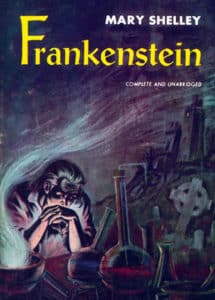Obsession
- an ‘over-focus’ on a goal; the goal takes over your life; it consumes an abnormal amount of your time, energy and attention

- the novel deals with the dangers of obsession; Victor is so consumed with the idea of creating the monster (life) that he isolates himself; and even becomes ill
- Mary Shelley’s theme is that obsession is harmful to you and those you love
Responsibility
- the concept that we must take care of the things we make, and that we are accountable for our actions; we must be prepared to face the consequences
- the novel deals with Victor’s inability (or unwillingness) to accept responsibility for the monster
- if we don’t take care of what we create (life) we are at risk of creating monsters in our society
Alienation
- a sense of not belonging to a community or lacking a sense of one’s own self
- the Creature in the novel constantly seeks to connect to someone
- tries to fit in with human society and is rejected
- is also rejected by Victor, his ‘father’
- Victor refuses to make the Creature a partner, someone who would accept him, and thereby condemns the Creature to a life of solitude
Guilt
- not only being responsible for committing an offence, but feeling remorseful for having done the offence
- in the novel, it is not only that characters feel guilt, but why they feel it
- there are many circumstances when characters feel guilt or remorse for their actions (or inaction)
- what the characters do about that remorse is what is important
Egoism/Pride
- a belief that self-interest should be the prime motivation for all conduct
- pride is a positive characteristic as long as it does not become destructive to the individual or others
- in the novel, there are three characters who suffer from egoism or foolish pride: R. Walton, Beaufort and Victor Frankenstein
- in the novel, those who are motivated by egoism or pride and do not change their ways meet a disastrous end
Family
- the structure of family and value of shared and loving intimacy to be given, and received, in family life
- there are various types of family relationships in the novel; some traditional, others not
- sibling bonds are very important
- the father-son relationship that should exist between Victor and the Creature does not
